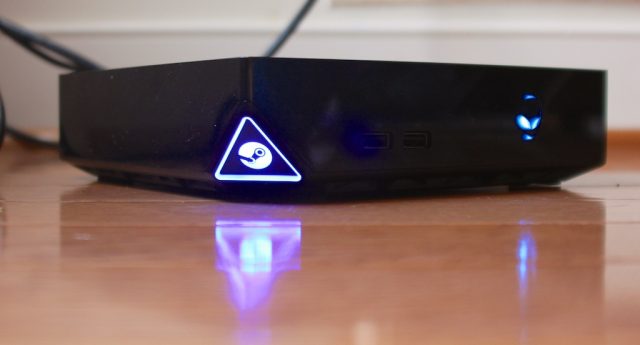
As reported by IT World, a $749 Alienware Steam Machine system will feature an Intel Core i5 Skylake CPU, an Nvidia GTX 960 GPU, 8GB of RAM, a 500GB hard drive, and 802.11ac Wi-Fi. For $899, you can upgrade that basic configuration with a Core i7 CPU and a 1TB hard drive.
Alienware is also keeping around the current, ultra-low-end, $449 Alienware Steam Machine, which sports a Core i3 processor, 4GB of RAM, and a custom Maxwell graphics card that "performs similarly to the NVIDIA® GeForce GTX 860M."
In an interview with ITWorld, Alienware Senior Marketing Manager Chris Sutphen admitted that Alienware's Steam Machines weren't as popular as their Windows-equipped twins in the Alienware Alpha line (which is also being upgraded to support higher-end CPUs and GPUs). Still, Sutphen was bullish on SteamOS' future, saying that "we expect the SteamOS catalog to strengthen at the end of year."
Sutphen put his faith in Vulkan, the recently released graphics API that he says should lessen the performance gap between SteamOS and DirectX-powered Windows games. Vulkan will also "speed up [the] transition for SteamOS to AAA content" compared to the previous OpenGL standard, Sutphen said.That would certainly be a big help for a platform that's attracted hundreds of indie games but not much in the way of big-budget blockbusters. Yet unless something drastic changes, the set of new SteamOS releases for the remainder of 2016 (and beyond) will remain a strict and much smaller subset of the games released for the established Windows gaming marketplace. All it takes is a few games launching on Windows but not SteamOs (say No Man's Sky and Battlefield 1, to name just a couple) to make potential customers wonder why they should miss out on some of PC gaming's biggest releases by giving up Windows.
Sure, you save a little bit of money thanks to Steam Machines' lack of a Windows license. Still, without some sort of big name SteamOS exclusives (or at least a performance improvement compared to Microsoft's OS), we don't see much that will convince average consumers to purchase a Steam Machine over a Windows box that can do all the same things and more, gaming-wise.
reader comments
183